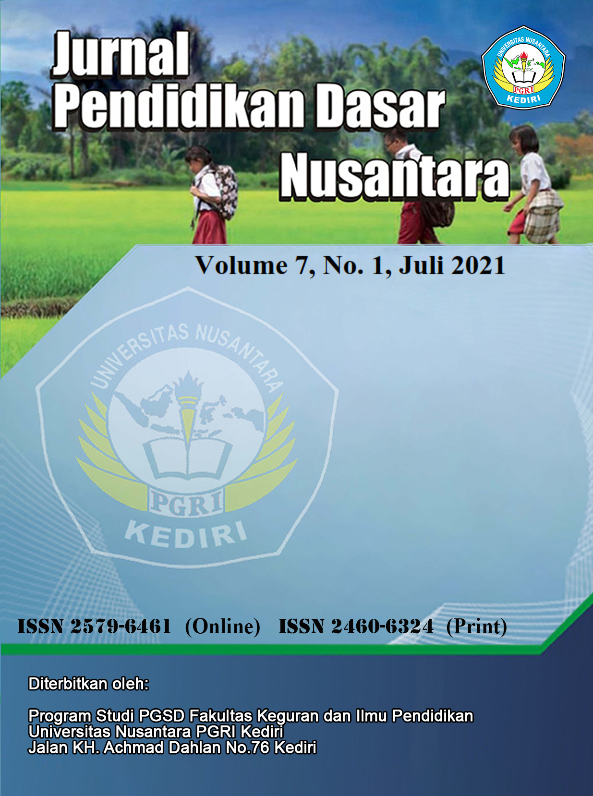Pengembangan LKPD Berbasis Cerita Bergambar Digital Pada Siswa Kelas IV SD
DOI:
https://doi.org/10.29407/jpdn.v7i1.16168Keywords:
teaching materials, picture stories.Abstract
Abstract: Based on the needs analysis carried out by the researchers at SDN Gadingkulon II, researchers obtained information that students had difficulty understanding material during the pandemic, students were also less enthusiastic about carrying out online learning, students were late in collecting and doing assignments. This is because the material provided is in the form of documents in the form of pdf, doc and Power Point. Questions given through the googleform platform. With these problems, learning activities during the pandemic cannot run well. Therefore, the problems that exist in the field must be addressed immediately. From the problems above, it can be overcome by developing LPDD based on digital picture stories. The purpose of this research is to develop LKPD teaching materials based on picture stories that can be used as an alternative to teaching materials used during the COVID-19 pandemic that are feasible, practical and effective and in accordance with the characteristics of students. This study uses the ADDIE development model which consists of five steps: Analyze (analyze), Design (design), Develop (development), Implementation (implementation), and Evaluation (evaluation). The subjects of this study were 4th grade students. The data collection techniques in this study were observation, interviews, questionnaires and documentation. The final result of the research shows that the validation results can be said to be feasible where the validation results from material experts get a validity level of 85.5% of these results have entered the valid or feasible type. which of these results can also be said to be valid or feasible to be tested.
Keywords: Teaching materials, picture stories.
Downloads
References
Alfianika, S., & Marni, S. (2019). Pengembangan Lembar Kegiatan Siswa Berbasis Komik pada Materi Menulis Poster dan Slogan. Jurnal Kependidikan, 3 (1), 43-53. Retrieved from https://journal.uny.ac.id/index.php/ jk/article/view/13163/pdf
Ayva, Ozge. 2012. Developing Students’ Ability to Read, Understand and Analyze Scientific Data Through The Use Of Worksheets That Focus On Studying Historical Documents. Procedia Social and Behavioral Sciences. Vol. 46. Juni 2012: 5128 – 5132.
Dini Rahma Diani, 2019. Pengembangan Lembar Kerja Peserta Didik Menulis Cerpen Berbasis Aplikasi Android. 1-13 Jurnal Basastra Jurnal Bahasa, sastra dan pengajaran. Volume 7 Nomor 2.
Eko Prasetyo Utomo, 2018. Pengembangan LKPD Berbasis Komik Untuk Meningkatkan Literasi Ekonomi Peserta Didik. Jurnal Penelitian Pendidikan Vol 35 Nomor 1 Tahun 2018. https://journal.unnes.ac.id/nju/index.php/JPP/article/view/14015.
Kim, D. H., Jang, H. G., Shin, D. S., Kim, S. J., Yoo, C. Y., dan Chung, M. S. 2012. Science Comic Strips. Journal of Education and Learning. Vol. 1 (2): 65-71
Kultawanich, K., Koraneekij, P., & NaSongkhla, J. (2015). A Proposed Model of Connectivism Learning Using Cloud-Based Virtual Classroom to Enhance Information Literacy and Information Literacy Self-Efficacy for Undergraduate Students. Procedia-Social and Behavioral Sciences, 191, 87–92. https://doi.org/10.1016/j.sbspro.20 15.04.394.
Nigsih, Endah Rahayu. 2016. Pengembangan Lembar Kerja Siswa Berbasis Cerita Bergambar Melalui Pendekatan Discovery Learning pada Mata Pelajaran Ilmu Pengetahuan Alam Kelas 5 SD Negeri Samban 02. Jurnal Premary School Teacher Education.
Miqro’ Fajari Lathifah, dkk, 2021. Efektivitas LKPD Elektronik sebagai Media Pembelajaran Pada Masa Pandemi Covid 19 Untuk Guru YPI Bidayatul Hidayah Ampenen. Jurnal Magister Pendidikan IPA.
Molenda, M. In Search of the ellusive ADDIE model. Performance Improvement, 42 (5), 34-36. Submitted for publication in A. Kovalchick & K. Dawson, Ed’s, Educational Technology: An Encyclopedia. Copyright by ABCClio, Santa Barbara, CA, 2003. Diakses dari laman http://www.indian.edu, pada 10 April 2018.
Prastowo, Andi. 2011. Panduan Kreatif Membuat Bahan Ajar Inofatif: Menciptakan Metode Pembelajaran yang Menarik Dan Menyenangkan. Yogjakarta: Diva Press
Prastowo, A. (2015). Panduan Kreatif Membuat Bahan Ajar Inovatif. DIVA Press.
Putri, L. H. (2014). Pengaruh Penggunaan Internet dalam Pembelajaran Jarak Jauh (E-Learning) terhadap Efektivitas Pengajaran Bahasa Indonesia Kepada Penutur Asing. Paper presented at the Asile 2014 Conference, Bali, Indonesia. Retrieved from https://www.eprints.uny.ac.id.
Rani Setiya Wati, Nurlaeli, Miftahul Husni. 2021. Pengembangan Lembar Kerja Berbasis Cerita Bergambar. Journal Of Intergrated Elementary Education. https://journal.walisongo.ac.id/index.php/jieed/article/view/7774/pdf
Rota, G., dan Izqulerdo, J. 2003. Comics as A Tool for Teaching Biotechnology In Primary Schools. Electronic Journal of Biotechnology. Vol. 6(2): 85-89.
Sugiyono. 2017. Metode Penelitian Pendidikan : Pendekatan Kuantitatif, Kualitatif, Dan R&D. Bandung: Penerbit Alfabeta.
Tatang Supriatna, Matahari, Muhammad Ihan. 2020. Pengembangan Lembar Kerja Peserta Didik Berbasis Komik Digital Pada Materi Sistem Bilangan Mata Pelajaran Sistem Komputer Kelas X. Jurnal Petisi Vol 1 No 2 2020
Thowfeek & Salam. (2014). Student’s Assesment on the Usability of ELearning Websites. Procedia: Social and Behavioral Sciences, 141, 916–922
Sugiyono. 2017. Metode Penelitian Pendidikan : Pendekatan Kuantitatif, Kualitatif, Dan R&D. Bandung: Penerbit Alfabeta.
Ulas, A. H., Sevim, O., dan Tan, E. 2012. The Effect of Worksheets Based Upon 5E Learning Cycle Model On Student Success in teaching of adjectives as Grammatical Components. Procedia Social and Behavioral Sciences. Vol. 31. 2012: 391-398.
Undang-undang Nomor 20 tahun 2003 tentang Sistem Pendidikan Nasional.
Downloads
Published
Issue
Section
License
Authors who publish with this journal agree to the following terms:
- Copyright on any article is retained by the author(s).
- The author grants the journal, the right of first publication with the work simultaneously licensed under a Creative Commons Attribution License that allows others to share the work with an acknowledgment of the work’s authorship and initial publication in this journal.
- Authors are able to enter into separate, additional contractual arrangements for the non-exclusive distribution of the journal’s published version of the work (e.g., post it to an institutional repository or publish it in a book), with an acknowledgment of its initial publication in this journal.
- Authors are permitted and encouraged to post their work online (e.g., in institutional repositories or on their website) prior to and during the submission process, as it can lead to productive exchanges, as well as earlier and greater citation of published work.
- The article and any associated published material is distributed under the Creative Commons Attribution-ShareAlike 4.0 International License

































